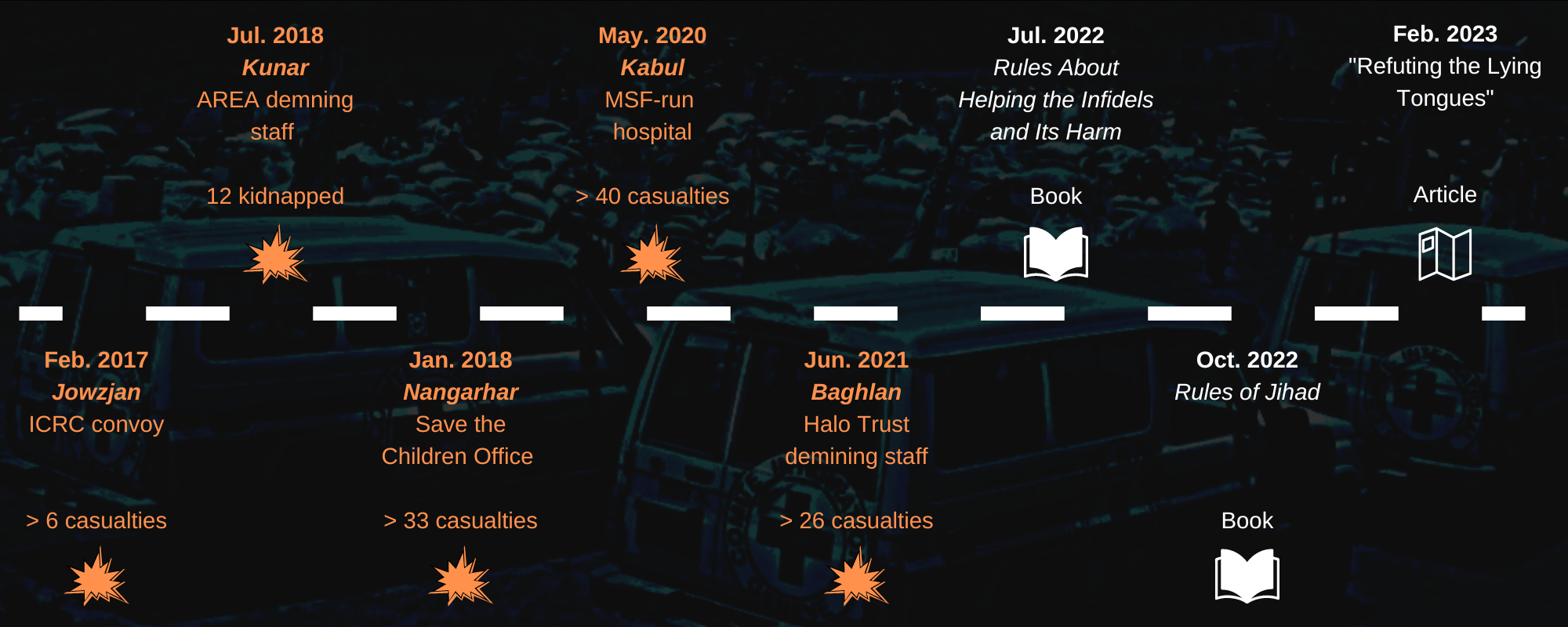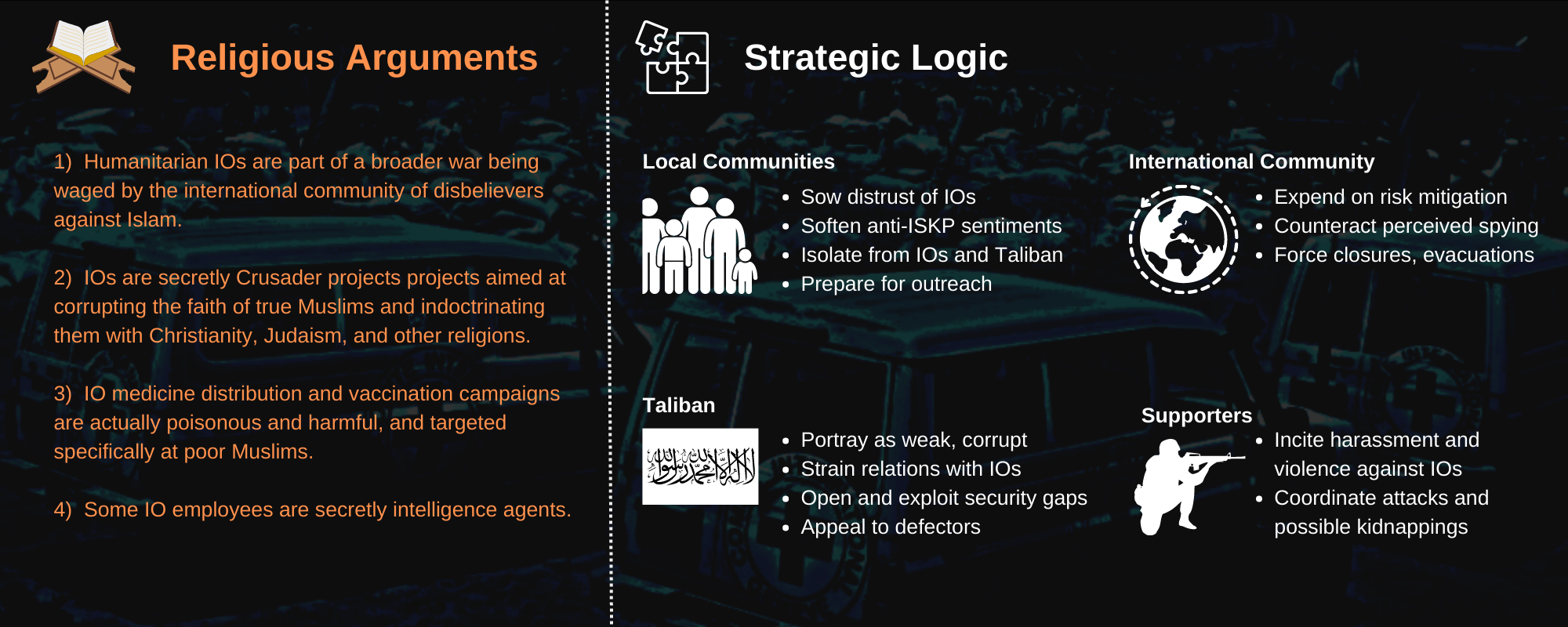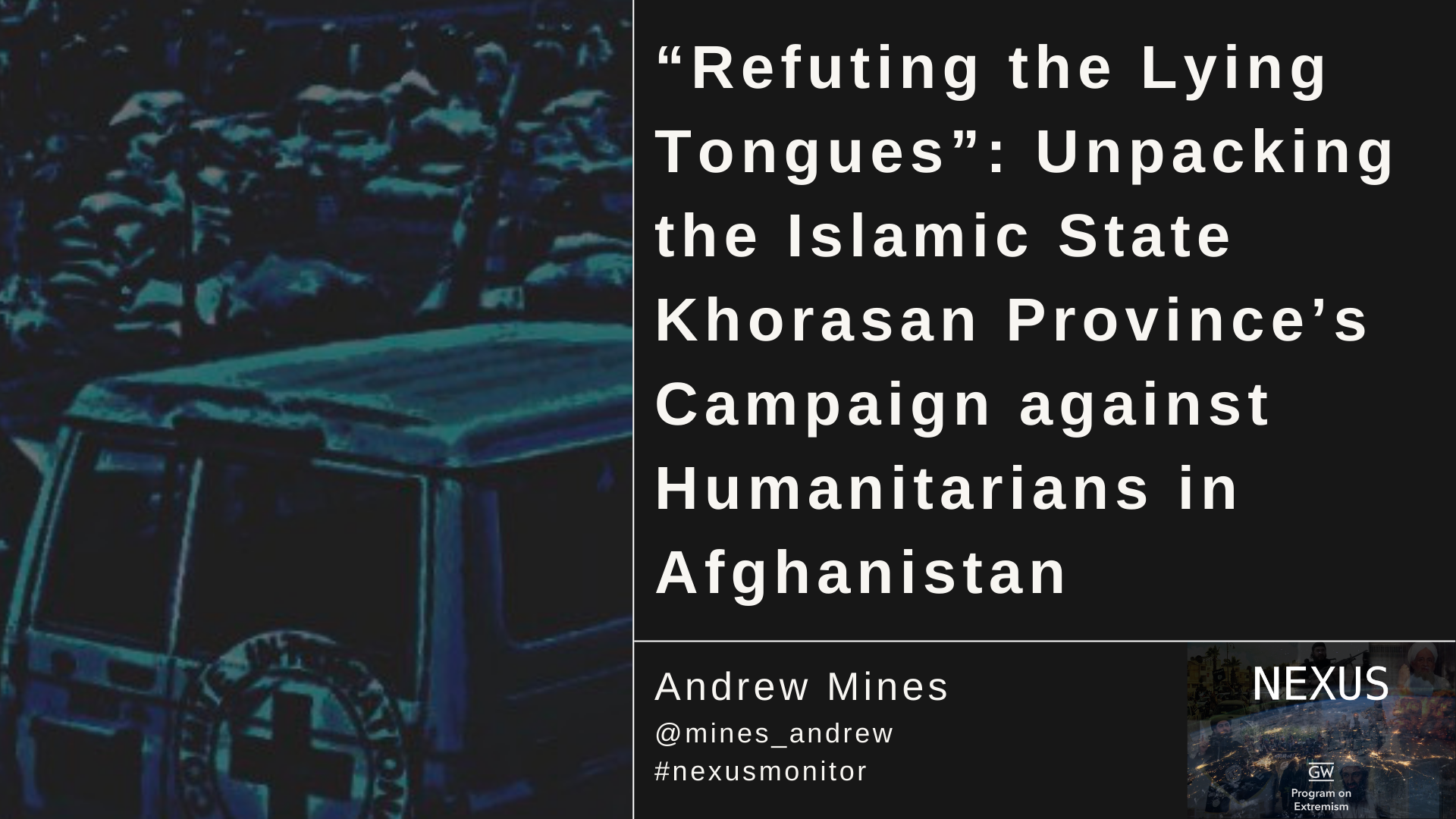PDF Version
AS PART OF ITS EVOLVING INSURGENCY in Taliban-ruled Afghanistan, the Islamic State Khorasan Province (ISKP, or ISIS-K) is expanding its campaign against humanitarian workers and organizations. In the latest issue of its premier English-language magazine, Voice of Khorasan, ISKP laid out a multi-pronged argument against allowing humanitarian international organizations (IOs) to operate in Afghanistan, going so far as to call for violence against aid organizations and their staff.
This article unpacks the context, religious justifications, and strategic logic of ISKP’s campaign against humanitarians. It argues that ISKP’s growing anti-humanitarian campaign is part of a broader strategy designed to plunge Afghanistan even deeper into crisis, and create the conditions necessary to fuel its insurgency. It concludes with considerations for international stakeholders still engaged in the country, including humanitarians and strategic communicators.
Context
Since the degrading of its territory and manpower from 2015 to early 2020 and then resurgence through to the present, ISKP has pursued an increasingly sophisticated strategy aimed at destabilizing Afghanistan. Several mutually-reinforcing campaigns underlie that strategy, including this latest effort against humanitarian IOs still servicing the Afghan people following the US-led withdrawal.
This is not the x time the Islamic State has targeted humanitarians in Afghanistan. In fact, a number of past violent incidents have affected staff and operations. Previous ISKP-linked attacks targeted an International Committee of the Red Cross (ICRC) convoy in February 2017, Agency for Rehabilitation and Energy Conservation in Afghanistan demining staff in July 2018, a Save the Children office in January 2018, a Doctors Without Borders (MSF)-run hospital in May 2020, and Hazardous Area Life-support Organization (HALO) Trust demining staff in June 2021. This list is by no means exhaustive, and does not include incidents in which humanitarian IO staff have been casualties in other ISKP-linked attacks,1 or private threats made directly to NGOs.
Where this latest period departs from previous sporadic attacks, however, is in the volume of propaganda releases explicitly naming humanitarian IOs, and declaring them legitimate targets for future violence. Over the last several months, ISKP outlets have been ramping up their production and dissemination of a range of books, articles, pamphlets, and other materials espousing anti-humanitarian views, sowing disinformation, and seeding distrust in recipient communities. Key among them were two books— Rules about Helping the Infidels and Its Harm, and Rules of Jihad— both of which provide the doctrinal basis for rejecting international aid and justifying violence against humanitarian staff and organizations. These books call out specific IOs by name,2 and their contents have since been repackaged and republished in a variety of mediums and formats,3 the most recent of which is an article in ISKP’s English-language Voice of Khorasan magazine titled, “Refuting the Lying Tongues.”4
Figure 1: Key Developments

The Strategic Logic of ISKP’s Anti-Humanitarian Campaign
ISKP ideologues and propagandists have put forth a suite of religious arguments against accepting humanitarian aid. In sum, these arguments hold that humanitarian IOs are part of a broader war on Islam, that their aim is to corrupt true Muslims’ faith, that they are distributing harmful medicine in Muslim communities, and that they are spying for foreign intelligence agencies. As a result, not only is accepting aid from humanitarian IOs forbidden, but the only solution is for true Muslims to purify the country by targeting and ousting humanitarians.
The strategic logic behind those arguments, however, involves a set of cross-cutting, mutually-reinforcing objectives that support ISKP’s broader strategy of destabilizing Afghanistan. Destabilization plays a foundational role in the Islamic State movement’s approach to insurgency. It defines a period in which group operations across military, propaganda, and other domains weaken state and non-state adversaries, accentuate crises, and build popular belief that the status quo is unacceptable. These operations pave the way for future efforts to consolidate control and eventually govern entire regions. ISKP’s anti-humanitarian campaign is but one aspect of this broader strategy, and is geared towards four key target audiences: 1) recipient local communities, 2) ISKP supporters, 3) the international community, and 4) the Taliban.
For recipient local communities, ISKP is trying to reframe locals’ understanding of violence against IO targets. To do so, the group spreads disinformation and sows distrust in order to soften anti-ISKP sentiments. At the same time, violence and the threat of violence serves to isolate communities from both IOs and the Taliban, and to harm communities’ perceptions of both entities. The cumulative effect is a more receptive local environment for ISKP outreach campaigns.
Among its supporters, ISKP is trying to incite— and almost certainly coordinate— harassment and violence against IOs and their staff. Successful attacks may be few and far between at first, but over time and with enough violence, ISKP’s goal is to make the environment so hostile that humanitarian missions are no longer feasible. Relatedly, ISKP’s aims for the international community are to force it to expend resources on risk mitigation measures, as well as to counteract perceived intelligence collection efforts. Eventually, the goal is to push IOs towards full closure of field activities, further isolating local communities.
Finally, for the Taliban, ISKP continues to portray its jihadist rival as weak and corrupt collaborators with foreign powers, simultaneously dependent on foreigners to provide basic services to Afghans but also incapable of protecting them when they do. ISKP’s jihadist identity and credibility are thereby cemented against a comparably weak Taliban, which can support parallel efforts to spur defections from Taliban ranks. Moreover, to counter the threat to aid workers and organizations, Taliban security resources will be forced to reconfigure against an increasingly dynamic threat environment. Such reconfigurations open new security vulnerabilities for ISKP to exploit, and further strain already-strained relations with the international community.
Figure 2: Religious Arguments and Strategic Logic

These dynamics will not play out overnight, and some of them may not yet be readily observable to international observers. However, two important trends are worth noting if humanitarians are to stay ahead of the Islamic State in Afghanistan.
First, to justify carrying out some of its most gruesome campaigns of violence, the Islamic State has consistently taken great efforts to shape the information environment with religious-jurisprudential rulings and complementary propaganda efforts. That ISKP has now built a sturdy ideological foundation on which to justify and wage a more concerted campaign against humanitarians in Afghanistan should be cause for serious concern.
Second, the Islamic State in Iraq and Syria has provided extensive religious and historical precedent for violence against humanitarians, both through prior executions of aid workers,5 as well as more recent rulings in official propaganda.6 As Figure 3 below shows, Islamic State-linked violent incidents involving aid workers worldwide have been steadily rising since 2017 following ISIS’s violent example in 2013 and 2014. ISKP is second only to the Islamic State West Africa Province (ISWAP) in the Lake Chad region for perpetrating violent incidents involving aid workers, and accounts for the lion’s share of staff affected. The upward trajectory of both global and Afghanistan-based violent incidents involving aid workers is clear.
Staying ahead of ISKP’s Anti-Humanitarian Campaign
Today in Afghanistan, humanitarians face a number of risks and challenges, of which the growing threat from ISKP may today seem marginal. The Taliban’s ban on female staff, detentions of aid workers, sanctions compliance, and other constraints are proving to be the biggest challenges. ISKP has clearly identified these dynamics as unique levers to pull in order to strengthen its own insurgency strategy, and try to outcompete the Taliban.
To stay ahead of the Islamic State in Afghanistan, the international community should consider developing a deeper understanding of Islamic State strategy and operations, including how they have been adopted and refined by ISKP. Such an appreciation will help stakeholders still engaged in the country to better recognize and prepare for escalations in ISKP operations, and counteract the group where possible.
To support humanitarian workers still operating in Afghanistan, stakeholders should consider carefully monitoring and assessing ongoing threats by leveraging all-source intelligence analysis and conducting regular risk assessment. Humanitarian IOs might revisit their risk mitigation and crisis response approaches, including how they provide not only for the physical safety but also the psychological health and well-being of their staff during these increasingly precarious times. IOs have a number of best practices available to them based on decades of experience in some of the most challenging regions of the globe. However, the unique circumstances in Afghanistan today warrant additional scrutiny and a more comprehensive understanding of ISKP’s strategy and operations.
Strategic communications considerations are also worth revisiting, both in terms of crisis response planning and how to best proactively support humanitarians on a range of issues, including countering disinformation. Communicators have a unique opportunity to transform how ISKP’s assault on humanitarians is perceived among local communities. Messaging efforts that highlight the valuable work being done by IOs and build positive relationships with local communities can go a long way to preventing future violence. ISKP initiated this campaign because it assessed it would gain the most impact for its limited resources; proactive counter-messaging may not prevent all future violence, but it can inflict significant social costs that force ISKP to de-prioritize expending resources on targeting humanitarians.
The fight against the Islamic State in Afghanistan today is as much an influence competition as it is a test of kinetic over-the-horizon counterterrorism measures. Sustainable counter-ISKP efforts will be vital for international stakeholders to truly out-compete this group and prevent any further deterioration in the situation facing Afghans.
Endnotes
[1] For example, IRC and IOM employees were killed in an ISKP attack on the Ministry of Refugees and Returnees July 2018 in Kabul. See: “IRC staff member killed in attack in Jalalabad, Afghanistan,” International Rescue Committee, available at: https://www.rescue.org/press-release/irc-staff-member-killed-attack-jalalabad-afghanistan; “Death of local UN staffer in latest Afghan suicide attack highlights tragic toll of violence against civilians,” UN News, (August 1, 2018). https://news.un.org/en/story/2018/08/1016112.
[2] Including ICRC, the World Health Organization (WHO), and the United States Agency for International Development (USAID), and others.
[3] Some examples include “Poison in Honey,” a pamphlet targeting vaccination efforts against polio, and various sections published in Voice of Khorasan magazine issues 11, 14, and 17, among others.
[4] “Refuting the Lying Tongues,” Voice of Khorasan 21, February 2023.
[5] Alan Henning, David Haines, Peter Kassig, and Kayla Mueller, among others.
[6] In August 2020, issue 247 of Al-Naba’ (ISIS’s weekly Arabic-language magazine) declared humanitarian organizations and workers as legitimate targets.


